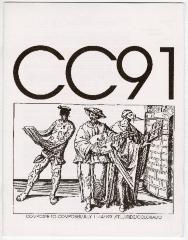Charles Amirkhanian Collection ➔ Composer-to-Composer Festival: Global Ethnicity (July 13, 1991)
Digital Audio
Event Type
Lectures and Panel DiscussionsOrigin
C AmirkhanianIdentifier
CTC.1991.07.13.3Program Series
Composer-to-Composer FestivalProgram Length
87 minDates
1991-07-13 | createdDescription
Charles Amirkhanian moderates a panel discussion on July 13, 1991 during the 1991 Composer-to-Composer Festival. The topics are ethnic influences in the artists' musics, and the difference between terms "inter-cultural" and "multi-cultural". Panelists include Alan Hovhaness, Eleanor Alberga, Fred Ho, Paul Dresher, Zakir Hussain, and Janice Giteck.Hovhaness begins by talking about how he was influenced by various ethnic musics through the communities he lived in, like the Armenian, Arabic and Greek ghettos of Boston. Zakir Hussain then talks briefly of the history of North Indian Classical music, while water is being poured for the artists. Paul Dresher remembers listening to Armenian music on the radio in Los Angeles, and later hearing Indian music, and being influenced by the chanting in Jewish temple. He also credits North Indian music for really teaching him to study and develop musically. One of Janice Giteck's earliest non-western musical experiences was, like Dresher, hearing the chantings of the cantor in a synagogue. She also discusses how she was influenced by Native American tribal musics and Indonesian gamelan. Eleanor Alberga begins by talking about her western classical training early on in Jamaica, and how she started out as a performer, being part of the Jamaican Folk Singers. After moving to England, she became part of an African dance troupe and was influenced by the musics she was exposed to through that experience. Alberga ends by talking about recent projects, including a primarily electronic score to a play done for the BBC based on a story about the former president of Uganda, Idi Amin.
Fred Ho starts a heated discussion around what he thinks multi-cultural or cross-cultural music should look like and many of the composers offer comments and counter arguments, sparking more questions between the participants, and later the audience. Many of the composers' comments address what seems to be the over-emphasis of racial concerns when the focus should be first and foremost, the music and the humanity shared between various races and people, and that converging to discuss global ethnicity shouldn't be so political.
At one point Alan Hovhaness interjects saying "This is too much", and exemplifies how his family was persecuted in their times and goes on to express "I hate this business of money and race taking the place of music". Pamela Z then offers some commentary on the issue of diversity in the audience of new music. Other comments are taken from audience members, including a question for the panel that asks if the impositions brought on by colonialism, are as a result, helping create something entirely new ?
Alicia Terzian later expresses how surreal the discussion is to her; coming from South America (Argentina) these discussions seem to be of little importance when many cultures here (in the USA) have the freedom to pursue their creative individuality. Why not focus on discussions about that–your work and what that brings to your society ?
After the panel ends, the audience is treated to a piano performance by Alan Hovhaness. Hovhaness performs "Blue Job Mountain", in three movements.
This recording captures great discussion; respective discourse despite opposing views, but never losing sight of why the group is there in the first place, which is to share their love of music and creating. The live and rare performance by Hovhaness makes this recording even more of a gem.
Genres
20th century classicalNew music
World music
Musical Selections
Dark Blue Circumstance [excerpt] (1982-87) (2:51) / Paul Dresher -- [excerpt, unidentified] (1:11) / Zakir Hussain -- Blue Job Mountain (1979) (7:58) / Alan HovhanessPerformers
Alan Hovhaness, piano (Blue Job)Paul Dresher, electric guitar, electronics (Dark Blue)
Zakir Hussain, tabla and voice (unidentified)
Subjects
Discussions in contemporary cultureComposers -- 20th century
Ethnic music
Related Event
Composer-to-Composer Festival, 1991Related place
Telluride (Colo.) (was recorded at)Related Entities
Amirkhanian, CharlesHovhaness, Alan, 1911-2000
Dresher, Paul
Giteck, Janice, 1946-
Ho, Fred Wei-han, 1957-2014
Hussain, Zakir, 1951-
Alberga, Eleanor
Z, Pamela, 1956-
Terzian, Alicia
